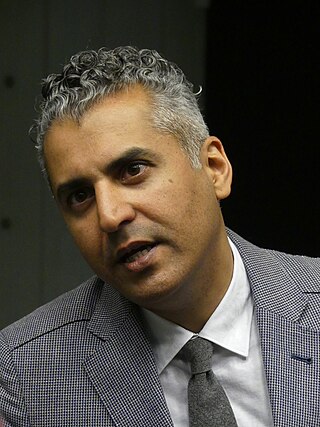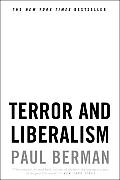Islamism refers to a broad set of religious and political ideological movements. The advocates of Islamism, also known as "al-Islamiyyun", are dedicated to realizing their ideological interpretation of Islam within the context of the state or society. The majority of them are affiliated with Islamic institutions or social mobilization movements, often designated as "al-harakat al-Islamiyyah." Islamists emphasize the implementation of sharia, pan-Islamic political unity, the creation of Islamic states, and rejection of non-Muslim influences.

The End of History and the Last Man is a 1992 book of political philosophy by American political scientist Francis Fukuyama which argues that with the ascendancy of Western liberal democracy—which occurred after the Cold War (1945–1991) and the dissolution of the Soviet Union (1991)—humanity has reached "not just ... the passing of a particular period of post-war history, but the end of history as such: That is, the end-point of mankind's ideological evolution and the universalization of Western liberal democracy as the final form of human government."
Islamic fundamentalism has been defined as a revivalist and reform movement of Muslims who aim to return to the founding scriptures of Islam. The term has been used interchangeably with similar terms such as Islamism, Islamic revivalism, Qutbism, Islamic activism, but also criticized as pejorative, a term used by outsiders who instead ought to be using more positive terms such as Islamic activism or Islamic revivalism.
Political aspects of Islam are derived from the Quran, ḥadīth literature, and sunnah, the history of Islam, and elements of political movements outside Islam. Traditional political concepts in Islam include leadership by elected or selected successors to Muhammad, known as Caliphs in Sunnī Islam and Imams in Shīʿa Islam; the importance of following the Islamic law (sharīʿa); the duty of rulers to seek consultation (shūrā) from their subjects; and the importance of rebuking unjust rulers.

Bassam Tibi, is a Syrian-born German political scientist and professor of international relations specializing in Islamic studies and Middle Eastern studies. He was born in 1944 in Damascus, Syria to an aristocratic family, and moved to West Germany in 1962, where he later became a naturalized citizen in 1976.

Laskar Jihad was an Islamist and anti-Christian Indonesian militia, which was founded and led by Jafar Umar Thalib. At present, the militia is believed to have disbanded.
Paul Lawrence Berman is an American writer on politics and literature.

Maʿālim fī aṭ Ṭarīq, also Ma'alim fi'l-tareeq, or Milestones, first published in 1964, is a short book written by the influential Egyptian Islamist author Sayyid Qutb, in which he makes a call to action and lays out a plan to re-create the "extinct" Muslim world on strictly Quranic grounds, casting off what he calls Jahiliyyah.

The Henry Jackson Society (HJS) is a trans-Atlantic foreign policy and national security think tank, based in the United Kingdom. While describing itself as non-partisan, its outlook has been described variously as right-wing, neoliberal, and neoconservative. The Society identifies itself with a "forward strategy" to spread democracy and liberal values globally. It is currently focused primarily on supporting global democracy in the face of threats from China and Russia. The Society is also known for its reports related to Islamic and far-right extremism. The Society is named after the US Senator and leading Democrat, Henry M. Jackson. American political journalist, Michael Allen, described the society as "a non-partisan group that convenes transatlantic center-left, center-right and independent figures committed to Jackson's legacy of 'democratic geopolitics.'"
The Muslim Canadian Congress was organized to provide a voice to Muslims who support a "progressive, liberal, pluralistic, democratic, and secular society where everyone has the freedom of religion."
"Islamofascism" is a term drawing an analogical comparison between the ideologies of Islamist or Islamic fundamentalist movements and the European fascist movements.

Islamic extremism, Islamist extremism or radical Islam refers to a set of extremist beliefs, behaviors and ideologies within Islam. These terms remain contentious, encompassing a spectrum of definitions, ranging from academic interpretations of Islamic supremacy to the notion that all ideologies other than Islam have failed and are inferior.
The term Talibanization refers to a type of Islamist practice that emerged following the rise of the Taliban movement in Afghanistan, where other religious groups or movements come to follow or imitate the strict practices of the Taliban.

Maajid Usman Nawaz is a British activist and former radio presenter. He was the founding chairman of the think tank Quilliam. Until January 2022, he was the host of an LBC radio show on Saturdays and Sundays. Born in Southend-on-Sea, Essex, to a British Pakistani family, Nawaz is a former member of the Islamist group Hizb ut-Tahrir. His membership led to his December 2001 arrest in Egypt, where he remained imprisoned until 2006. While there, he read books about human rights and made contact with Amnesty International who adopted him as a prisoner of conscience. He left Hizb-ut-Tahrir in 2007, renounced his Islamist past, and called for a secular Islam. Later, Nawaz co-founded Quilliam with former Islamists, including Ed Husain.

Terrorism in the United Kingdom, according to the Home Office, poses a significant threat to the state. There have been various causes of terrorism in the UK. Before the 2000s, most attacks were linked to the Northern Ireland conflict. In the late 20th century there were also attacks by Islamic terrorist groups. Since 1970, there have been at least 3,395 terrorist-related deaths in the UK, the highest in western Europe. The vast majority of the deaths were linked to the Northern Ireland conflict and happened in Northern Ireland. In mainland Great Britain, there were 430 terrorist-related deaths between 1971 and 2001. Of these, 125 deaths were linked to the Northern Ireland conflict, and 305 deaths were linked to other causes, including 270 in the Lockerbie bombing. Since 2001, there have been almost 100 terrorist-related deaths in Great Britain.

Sayyid Ibrahim Husayn Shadhili Qutb was an Egyptian political theorist and revolutionary who was a leading member of the Muslim Brotherhood. He is dubbed the "father of Salafi jihadism", the religio-political doctrine that underpins the ideological roots of global jihadist organisations such as al-Qaeda and ISIL.
Religious liberalism is a conception of religion which emphasizes personal and group liberty and rationality. It is an attitude towards one's own religion which contrasts with a traditionalist or orthodox approach, and it is directly opposed by trends of religious fundamentalism. It is related to religious liberty, which is the tolerance of different religious beliefs and practices, but not all promoters of religious liberty are in favor of religious liberalism, and vice versa.
Islamic extremism in the United States comprises all forms of Islamic extremism occurring within the United States. Islamic extremism is an adherence to fundamentalist interpretations of Islam, potentially including the promotion of violence to achieve political goals. In the aftermath of the September 11, 2001 terror attacks, Islamic extremism became a prioritized national security concern of the U.S. government and a focus of many subsidiary security and law enforcement entities. Initially, the focus of concern was on foreign Islamic terrorist organizations, particularly al-Qaeda, but in the course of the years since the September 11 terror attacks, the focus has shifted more towards Islamic extremist radicalized individuals and jihadist networks within the United States.

Radical: My Journey out of Islamist Extremism is a 2012 memoir by the British activist Maajid Nawaz, who is also a former Islamist. First published in the United Kingdom, the book describes Nawaz's journey "from Muslim extremist to taking tea at Number 10". The United States edition contains a preface for American readers and a new, updated epilogue.
This is a list of individual liberal and progressive Islamic movements in Europe, sorted by country. See also Islam in Europe and Euroislam.










